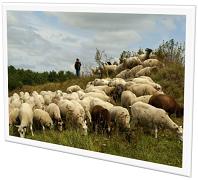Home Visitation and the Lord’s Supper
Home Visitation and the Lord’s Supper
The Occasion⤒🔗
It is not without reason that I once again emphatically request your attention to the theme of “Home visitation and the Lord’s Supper”.1 I was somewhat startled when I learned about a jury’s evaluations of entries to a contest on the occasion of the fiftieth edition of the magazine “Dienst” (Service). The jury writes about the opinions of the contributors on the “role” of elders. “To one person an elder must be a ‘governor’, to another he must be a ‘provider’ of the congregation, and for yet another someone who must do a lot of pastoral work. Where an elder loses his traditional job responsibilities, the task of pastoral care, with a view to the holiness of the congregation, will suffer. A number of contributors especially judge the aspect of elder visitations as an outdated affair.”2
 I have the impression that nowadays there is much talk of the elder as a “booster”, as someone who needs to stimulate the congregation to use its gifts and talents, but very little attention is given to the elder as an “overseer”, someone whose task it is to be watchful over their souls.
I have the impression that nowadays there is much talk of the elder as a “booster”, as someone who needs to stimulate the congregation to use its gifts and talents, but very little attention is given to the elder as an “overseer”, someone whose task it is to be watchful over their souls.
In the Reformed Churches, historically speaking, the home visitation has served as a means to carry out this task of overseeing. The Form for Ordination notes in the first place that the elder’s mandate is “to have supervision that every member may conduct himself properly in doctrine and life, according to the gospel.” Elders who go on home visitations may not forget this. This first task challenges us especially when we acknowledge that throughout the ages there has been a close connection between home visitation and the Lord’s Supper. From a historical perspective the orientation of a home visitation is strongly focused on a meaningful celebration of the Supper of the Lord. This becomes clear also from the old Church Order of Dordt that decreed in Art. 20 that the elders would make a visitation before and after the supper, ‘as much as the opportunity of time and the edification of the congregation would allow’. At the revision of this Church Order by General Synod Groningen-South 1978 the words ‘before and after the supper’ were removed; something which – as I shall argue later – is to be deplored.
Instead of the Confessional←⤒🔗
Whoever studies the matter will discover that the home visitation came in the place of the confessional in the era of the Great Reformation. Already in the early Middle Ages the confessional is introduced as a preparation for the worthy celebration of the sacrament. According to commonly accepted view, the origin of the confessional as an ecclesiastical establishment lies with the Irish monasteries where monks would confess their sins to each other at set times. From Ireland, the Anglo-Saxon missionaries imported the confessional to the mainland.3 In the 9th century it becomes an accepted practice to confess one’s sins at the beginning of the fasting during Lent, in preparation for communion at Easter.
The Fourth Lateran Council (1215) fixes a general confessional duty: “Every believer, of either gender, ought to faithfully name and confess all his sins after he has come to his years of discernment, at least once a year in the presence of his priest. As much as he is able he must also be resolved to pay the prescribed fine, and should ensure that during Easter he receives with reverence the sacrament of the supper…”
The council is convinced that through the confessional one receives the right of admission to Christ’s Supper. One would confess one’s sins and receive acquittal from the father confessor.
In 1 Corinthians 11 Paul speaks of a person examining himself. Yet in the Middle Ages this right and duty to test oneself is taken away from the congregation. In the end it is the father confessor who will judge whether one can participate.
In this way the confessional pew came to stand in the path to Christ’s table, and the priests would stand guard for the holiness of this table!
The reformers of the 16th century take a firm position against this Roman practice of confession. Luther characterizes the confessional as ‘the pope’s monkey law’. His opposition is especially aimed at the coercion to confess and to name one’s sins. According to Luther, this goes contrary to the Christian freedom.4 Sometime later this reformer does acknowledge a compulsory confessional, although for Luther it takes on the character of an examination of one’s faith, with a view to a meaningful celebration of the supper. Luther considers it desirable to have this test of faith a few times each year, even though for some it might be just once in their lifetime. With Luther there is no such thing as elders who keep watch over the holiness of the congregation and who guard the admission to the table. Luther’s church remains ‘a minister’s church’; the clergy (Pfarrer) supervises whether one can attend the supper or not.
 Calvin too wants nothing to do with the Roman practice of confessionals. It is not up to the priest whether or not to grant admittance to the sacrament. However Calvin deems it desirable that there is a pastoral talk with the minister when one wants to participate in the supper. He writes, “Meanwhile, that the flock present themselves before the pastor whenever they would partake of the Holy Supper, I am so far from disapproving, that I am most desirous it should be everywhere observed. For both those whose conscience is hindered may thence obtain singular benefit, and those who require admonition thus afford an opportunity for it; provided always no countenance is given to tyranny and superstition” (Institutes, III, 4,13).
Calvin too wants nothing to do with the Roman practice of confessionals. It is not up to the priest whether or not to grant admittance to the sacrament. However Calvin deems it desirable that there is a pastoral talk with the minister when one wants to participate in the supper. He writes, “Meanwhile, that the flock present themselves before the pastor whenever they would partake of the Holy Supper, I am so far from disapproving, that I am most desirous it should be everywhere observed. For both those whose conscience is hindered may thence obtain singular benefit, and those who require admonition thus afford an opportunity for it; provided always no countenance is given to tyranny and superstition” (Institutes, III, 4,13).
When Calvin has returned to Geneva after his (forced) stay at Strasbourg, this pastoral conversation is replaced with a visit to the homes, where elders also begin to function in the matter of participating in the Lord’s Supper. By involving the elders Calvin followed the example of Bucer, the reformer of Strasbourg. It is generally accepted that in 1550 the home visitation became an established practice of the church.5
From a letter of Calvin to Caspar Olevianus it appears that this home visit was especially directed at the celebration of the supper. Calvin writes, “As far as the adults are concerned, we have initiated an enquiry in each family. We divide the neighborhoods among each other such that we may examine the districts row by row. An elder accompanies the minister. Newly arrived members are being examined. For those who were already accepted this is omitted; with such persons it is ascertained that there is peace and order in the home; that there is no quarrel with the neighbours; that there is found no severe drunkenness, and whether people are not tardy or neglectful in the regular attendance of the preaching of the Word.”6
With Calvin the home visitation fully replaces the Roman confessional as the instrument to safeguard the holiness of Christ’s table!
The reformed churches in the Netherlands followed in Calvin’s footsteps as well. It even became a provision that elders would visit the members both before and after the celebration of the Lord’s Supper. The national synod of The Hague, 1586, prescribed to the elders that they “would make a visitation before and after the supper, as much as the opportunity of time and the edification of the congregation would allow, to comfort, to teach, and also to admonish others to the Christian religion”.7 We discover that the home visit is not only focused on the preparation for the celebration but that it serves also to assist the members of the congregation in a pastoral way, yes even to spur on others to faith.
The Aim of the Home Visit←⤒🔗
Why do elders bring home visits? The answer, I believe, needs to be: because they are shepherds who must have oversight of the flock (Acts 20:28) and who care for the flock (1 Peter 5:2). In the Belgic Confession, Art. 30, the ministers of the Word are called “shepherds”. I consider it of significant gain that the churches have learned to understand that elders are shepherds as well. And because they are shepherds, they search for the sheep. Their position gives them full rights to visit us in our homes. At the same time, for the elder this right also becomes an obligation. A true shepherd does not wait for the sheep to come to him; he looks for them, lets himself be found where things are taking place.
I think it is important to give special emphasis to this aspect of the pastoral task of elders today. The elder is not some sort of ecclesiastical craftsman who comes with frameworks, tries to stimulate the members, and ensures that everyone functions together as one unit. He is first of all the shepherd who is keeping watch over their souls (Heb. 13:17), who teaches (1 Tim. 3:2), who is placed over them “in the Lord” and admonishes them (1 Thess. 5:12), who cares for God’s church (1 Tim. 3:5) and who rules well (1 Tim. 5:17). To accomplish all this, the elders (also) go on home visits. Art. 20 of our Church Order summarizes it well when it states, “the task of elders is to govern the congregation in pastoral care…” This article envisions as aim of the home visits that the congregation is being built up. I fully concur, for the New Testament repeatedly points out that the aim of all service work of office bearers is “for the upbuilding” of the congregation (cf. 2 Cor. 12:19; Eph. 4:12).
This upbuilding needs to have depth: the congregation must be anchored and strengthened in the faith, and it must have breadth: it needs to grow numerically. We are dealing here with what is characterized in the Heidelberg Catechism, Lord’s Day 48, as “‘preserve and increase the church”. The building up internally leads to extension externally, as we can read in Acts 9:31, “So the church throughout all Judea and Galilee and Samaria had peace and was being built up. And walking in the fear of the Lord and in the comfort of the Holy Spirit, it multiplied.”8 The aim of the home visit is that the congregation increasingly gets to know Christ, becomes rooted in Him, lives according to the gospel, and in this way lets its light shine for the people outside.
 It is therefore an oversimplistification when it is said, “the minister sows the Word and the elders look for the fruits”.9 During the home visit the elders do not just come looking for fruit. They are active as shepherds caring for their sheep. They shepherd them with the Word, seek for what is lost, aim to bring back those who had wandered off, they bind up wounds and strengthen the weak (cf. Ezek. 34:16). The elder too proclaims the Word, not publicly like the minister, but privately in the homes. Not in the form of a sermon, but by way of a conversation. You could compare it to exchanging some large currency bills – the public proclamation of the Word – for some small cash – the personal-directed interaction through the elder. Prof. C. Trimp points out that from the beginning the Reformed Churches have placed the home visitation – personal care for the soul – within the framework of the proclamation of the holy gospel.10 It’s great when an elder shows a hearty sympathy for the members of his ward, and that he shows up in their homes on a regular basis. However, let him not forget that he does not need to profile himself as the great ‘sympathizer’, but as the shepherd who feeds the flock with the Word.
It is therefore an oversimplistification when it is said, “the minister sows the Word and the elders look for the fruits”.9 During the home visit the elders do not just come looking for fruit. They are active as shepherds caring for their sheep. They shepherd them with the Word, seek for what is lost, aim to bring back those who had wandered off, they bind up wounds and strengthen the weak (cf. Ezek. 34:16). The elder too proclaims the Word, not publicly like the minister, but privately in the homes. Not in the form of a sermon, but by way of a conversation. You could compare it to exchanging some large currency bills – the public proclamation of the Word – for some small cash – the personal-directed interaction through the elder. Prof. C. Trimp points out that from the beginning the Reformed Churches have placed the home visitation – personal care for the soul – within the framework of the proclamation of the holy gospel.10 It’s great when an elder shows a hearty sympathy for the members of his ward, and that he shows up in their homes on a regular basis. However, let him not forget that he does not need to profile himself as the great ‘sympathizer’, but as the shepherd who feeds the flock with the Word.
Home Visitation and the Lord’s Supper←⤒🔗
We have seen how in Calvin’s Geneva the theme and purpose of the home visitation was anchored in a worthy celebration of the supper. I would like to plead for this to once again function among us. The elders need to realize that precisely the home visit serves as the means to keep watch over the holiness of Christ’s table. During a home visit many matters may be discussed; the life of faith encompasses much more than participating at the supper. The Lord wants to be served in all situations in which his children find themselves. But at the heart of this life of faith we find the table of the Lord. At the supper our lives as Christians come together. In particular we are Christians where we with bread and the cup witness, where we professingly proclaim the significance of Christ’s death. Nowhere are we more intensely a member of Christ’s congregation than at his table.
The value people placed on this in the time of the Reformation becomes clear in the way they spoke about admittance to the supper. It was referred to as ‘to give oneself to the congregation’.11 Being a member of the church manifests itself in the first place around the supper table where people celebrate the blessed memory in communion. Christ commanded us to eat the bread and drink from the cup, and in doing so we express our obedience to him and we live our lives together with him.
The home visit is a form of pastoral care, realized through a conversation. It concerns a dialogue where members can have their say and where elders need to listen well. Yet a home visit is not just a conversation between believers meeting together; it has an official character. The elders come to the homes as office bearers who have been entrusted with the supervision of the congregation. “Scripture forbids us to use this word ‘supervision’ in such an anemic and cold manner by interpreting it in a mere ‘judicial’ sense or, even worse, in the sense of an ‘inquisition’. The accentuation of the official character does however prevent the degeneration of the home visit to a pietistic chat.”12
 We may not forget that the home visit is made to concretely give substance to the concept of supervision. Not in the least do elders visit to ensure that each member conforms in walk and life to the gospel. That is the reason why the elders speak to those whom they visit about their walk of life before the Lord in all its various aspects. They want to hear how the preaching of the Word motivates our hearts and our lives, and they want to help us to live according to the Word. But in our obedience to that Word, celebrating the Lord’s Supper in a worthy way is top priority. That is where the focal point and starting point are found for our lives with the Lord. Our ‘new obedience’ shines there more clearly than anywhere else. A.A. van Ruler is correct when he writes, “On a home visitation, the question about the celebration of the Lord’s Supper is very essential. It could even be said that principally this is the only reason why the elders visit. On this one question depends all our church life, our spiritual, personal, and social well being.”13
We may not forget that the home visit is made to concretely give substance to the concept of supervision. Not in the least do elders visit to ensure that each member conforms in walk and life to the gospel. That is the reason why the elders speak to those whom they visit about their walk of life before the Lord in all its various aspects. They want to hear how the preaching of the Word motivates our hearts and our lives, and they want to help us to live according to the Word. But in our obedience to that Word, celebrating the Lord’s Supper in a worthy way is top priority. That is where the focal point and starting point are found for our lives with the Lord. Our ‘new obedience’ shines there more clearly than anywhere else. A.A. van Ruler is correct when he writes, “On a home visitation, the question about the celebration of the Lord’s Supper is very essential. It could even be said that principally this is the only reason why the elders visit. On this one question depends all our church life, our spiritual, personal, and social well being.”13
The implication is not that on each home visit the subject of the celebration of the supper needs to be mentioned explicitly. Even so, I do believe that in our often superficial and hurried lives it is necessary to address the proper preparation, the earnestness of the supper, and the consequences of proclaiming Christ’s death. The holiness of Christ’s table may not be disregarded, and we may not lose sight of a worthy celebration.
In Closing←⤒🔗
There is more that can be said about the home visitation than I have touched upon here. I have not provided any practical, concrete suggestions as to how to conduct such a visit. My intention was to offer some pushback to a (threatening) development where with a view to the holiness of the congregation the pastoral work gets snowed under. I fear that the character of the home visit may be changing, becoming more and more like a pleasant conversation between believers, where the elder only functions as ‘discussion partner’. We need to have open eyes and open ears to what Scripture says about the task of the office bearer and the oversight that is entrusted to him.
Historically, we have seen how the home visit has functioned in the Reformed Churches especially with a view to preserving the holiness of Christ’s table.
That is the reason why I deplore the fact that in our current article 21, dealing with home visitations, every reference to the Lord’s Supper is lacking. I struggle with the motivation which the deputies alleged at the time: “Of course the regular home visits have everything to do with the proper celebration of the supper, but likewise it speaks of the importance of church attendance, and of everything that belongs to a life in obedience to God’s commandments.”14 My difficulty lies in the use of that word ‘likewise’, used in a sense of leveling down the matter of the Lord’s Supper. It remains the focal point in which all of our Christian lives are concentrated. Exactly there, at the table, it focuses our lives in accordance with God’s will; this is where our new obedience is being revealed.
The one big, principal question among all other questions that may be asked during a home visit concerns the inquiry about our eating and drinking in faith. At their home visits, elders may not forget that they stand guard at Christ’s table!
This article was translated by Wim Kanis.

Add new comment